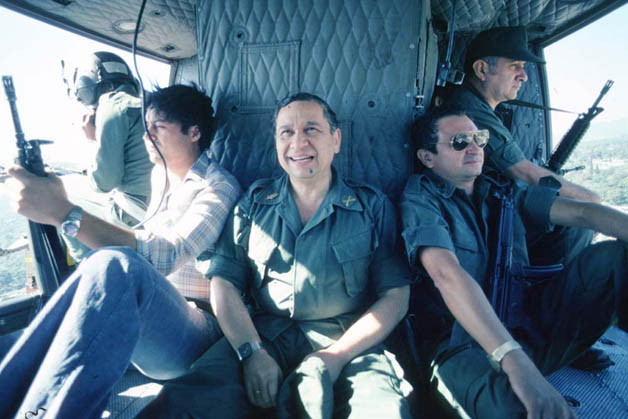
CJA has campaigned aggressively to hold Generals García and Vides Casanova accountable for war crimes committed in during under their leadership during the Salvadoran Civil War (1979-1992). CJA’s advocacy work, including the civil suit and a congressional testimony, resulted in DHS initiating removal proceedings against General García and General Vides Casanova in 2009.
Policy Efforts
Congressional testimony is a key component of CJA’s legislative advocacy efforts. In 2007, CJA client Dr. Juan Romagoza and then Executive Director Pamela Merchant testified before the U.S. Senate Judiciary Committee’s Subcommittee on Human Rights and the Law. The hearing, entitled “No Safe Haven: Accountability for Human Rights Violators in the U.S.,” comprised “the first ever congressional hearing on the enforcement of human rights laws in the United States.”
Their testimony, along with that of other witnesses and statement submissions by prominent human rights groups, galvanized the support of Senators Durbin (D—IL) and Coburn (R—OK), who lobbied DOJ and DHS to prosecute or deport Generals García and Vides Casanova. In his statement before the Subcommittee, Senator Durbin highlighted the “cruel irony” of immigration regulations that exclude victims but offer sanctuary to “hideous henchmen who have been involved in war crimes around the world.” In 2009, as a result of the Senators’ lobbying efforts and CJA’s behind-the-scenes advocacy, the U.S. Attorney in Miami, Florida, indicted General García on two counts of immigration fraud, and DHS pursued removal proceedings against him.
Removal Proceedings
In February 2013, General García and his counsel appeared in the Miami Immigration Court. In response to the robust body of evidence presented by the prosecution, General García admitted to personal knowledge of war crimes committed under the auspices of his leadership in the sense that such crimes were “public knowledge that cannot be denied.”
In February 2014, Judge Horn ruled against Garcia, a comprehensive victory for the prosecution and for the enforcement of human rights laws in the United States. The decision exceeded earlier decisions in scope, finding not only that General García “assisted or otherwise participated” in extrajudicial killing and torture, but also that he did so with conduct that was “active, direct, and integral” to the commission of these war crimes. On each count, he “knew or should have known” that his subordinates were engaged in extrajudicial criminal activity, and he invariably neglected to investigate or prevent this activity, at times denying it outright. Most damningly, “as the head of the armed forces and the most powerful person in El Salvador,” General García “fostered, and allowed to thrive, an institutional atmosphere in which the Salvadoran armed forces preyed upon defenseless civilians under the guise of fighting a war against communist subversives.”
On December 15, 2015, the U.S. Board of Immigration Appeals upheld and finalized the removal order of García. The Board relied on its precedent ruling in the case against General Vides Casanova for its decision. The Board also relied on expert witness testimony from Stanford Professor Terry Karl and testimony from CJA client Dr. Juan Romagoza Arce. General García was removed from the United States on January 8, 2016.